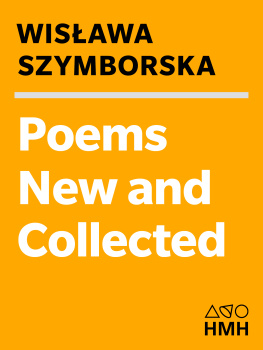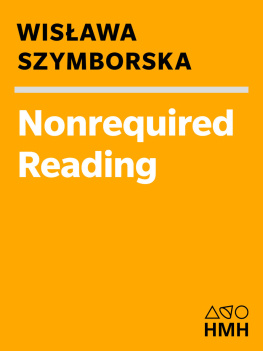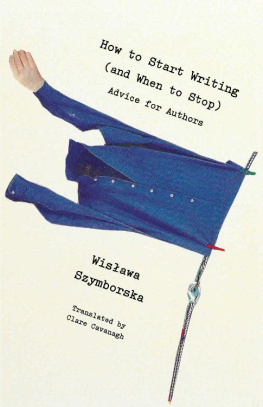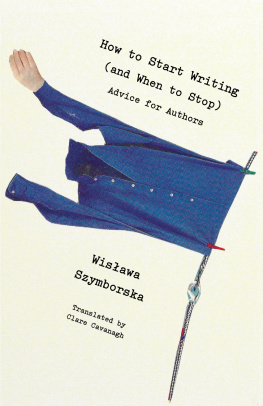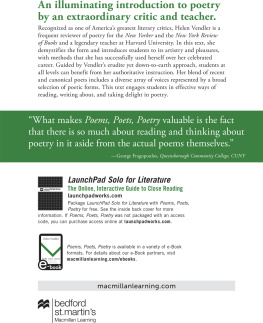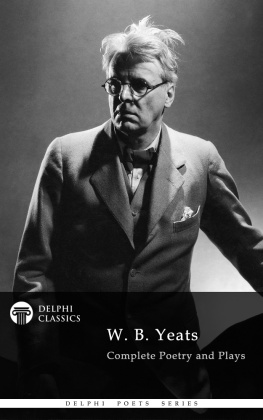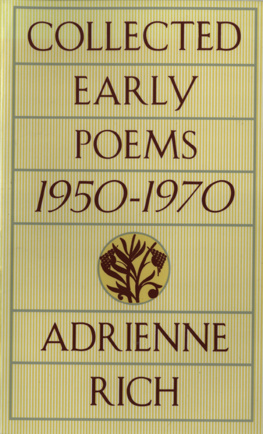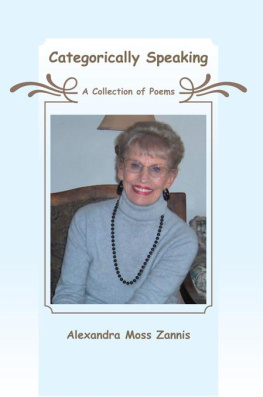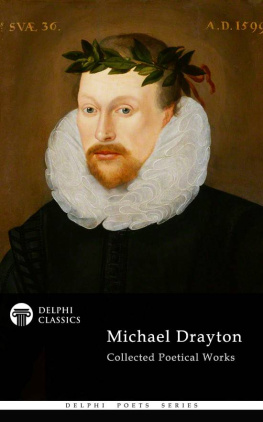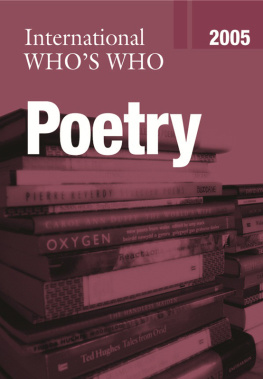English translation copyright 1998 by Harcourt, Inc. All rights reserved. No part of this publication may be reproduced or transmitted in any form or by any means, electronic or mechanical, including photocopy, recording, or any information storage and retrieval system, without permission in writing from the publisher. For information about permission to reproduce selections from this book, write to Permissions, Houghton Mifflin Harcourt Publishing Company, 215 Park Avenue South, New York, New York 10003. Text of the Nobel Lecture copyright 1996 by The Nobel Foundation www.hmhco.com All poems from View with a Grain of Sand, Selected Poems appear in this volume. cm. cm.
ISBN 0-15-100353-X
ISBN 0-15-601146-8 (pbk.)
1. Szymborska, WisawaTranslations into English.
I. Baraczak, Stanislaw, 1946. II. Cavanagh, Clare. III.
Title.
PG7178.Z9A222 1998
891.8'517dc21 97-32277 e ISBN 978-0-547-54389-5
v1.0315
The Poet and the World
Nobel Lecture 1996 They say that the first sentence in any speech is always the hardest. Well, that ones behind me. But I have a feeling that the sentences to comethe third, the sixth, the tenth, and so on, up to the final linewill be just as hard, since Im supposed to talk about poetry. Ive said very little on the subjectnext to nothing, in fact. And whenever I have said anything, Ive always had the sneaking suspicion that Im not very good at it. This is why my lecture will be rather short.
Imperfection is easier to tolerate in small doses. Contemporary poets are skeptical and suspicious even, or perhaps especially, about themselves. They publicly confess to being poets only reluctantly, as if they were a little ashamed of it. But in our clamorous times its much easier to acknowledge your faults, at least if theyre attractively packaged, than to recognize your own merits, since these are hidden deeper and you never quite believe in them yourself. When they fill out questionnaires or chat with strangersthat is, when they cant avoid revealing their professionpoets prefer to use the general term writer or replace poet with the name of whatever job they do in addition to writing. Bureaucrats and bus passengers respond with a touch of incredulity and alarm when they discover that theyre dealing with a poet.
I suppose philosophers meet with a similar reaction. Still, they are in a better position, since as often as not they can embellish their calling with some kind of scholarly title. Professor of philosophy: now that sounds much more respectable. But there are no professors of poetry. That would mean, after all, that poetry is an occupation requiring specialized study, regular examinations, theoretical articles with bibliographies and footnotes attached, and, finally, ceremoniously conferred diplomas. And this would mean, in turn, that its not enough to cover pages with even the most exquisite poems in order to become a poet.
The crucial element is some slip of paper bearing an official stamp. Let us recall that the pride of Russian poetry, the future Nobel Laureate Joseph Brodsky, was once sentenced to internal exile precisely on such grounds. They called him a parasite, because he lacked official certification granting him the right to be a poet. Several years ago, I had the honor and the pleasure of meeting Brodsky. And I noticed that, of all the poets Ive known, he was the only one who enjoyed calling himself a poet. He pronounced the word without inhibitions.
Just the opposite: he spoke it with defiant freedom. This must have been, it seems to me, because he recalled the brutal humiliations that he experienced in his youth. In more fortunate countries, where human dignity isnt assaulted so readily, poets yearn, of course, to be published, read, and understood, but they do little, if anything, to set themselves above the common herd and the daily grind. And yet it wasnt so long ago, it was in this centurys first decades, that poets strove to shock us with their extravagant dress and eccentric behavior. But all this was merely for the sake of public display. The moment always came when poets had to close the doors behind them, strip off their mantles, fripperies, and other poetic paraphernalia, and confrontsilently, patiently awaiting their own selvesthe still-white sheet of paper.
For finally this is what really counts. Its not accidental that film biographies of great scientists and artists are produced in droves. The more ambitious directors seek to reproduce convincingly the creative process that led to important scientific discoveries or to the emergence of a masterpiece. And one can depict certain kinds of scientific labor with some success. Laboratories, sundry instruments, elaborate machinery brought to life: such scenes may hold the audiences interest for a while. And those moments of uncertaintywill the experiment, conducted for the thousandth time with some tiny modification, finally yield the desired result?can be quite dramatic.
Films about painters can be spectacular, as they go about recreating every stage of a famous paintings evolution, from the first penciled line to the final brushstroke. And music swells in films about composers: the first bars of the melody that rings in the musicians ears finally emerge as a mature work in symphonic form. Of course this is all quite nave and doesnt explain the strange mental state popularly known as inspiration, but at least theres something to look at and listen to. But poets are the worst. Their work is hopelessly unphotogenic. Someone sits at a table or lies on a sofa while staring motionless at a wall or ceiling.
Once in a while this person writes down seven lines, only to cross out one of them fifteen minutes later, and then another hour passes, during which nothing happens.... Who could stand to watch this kind of thing? Ive mentioned inspiration. Contemporary poets answer evasively when asked what it is, and if it actually exists. Its not that theyve never known the blessing of this inner impulse. Its just not easy to explain to someone else what you dont understand yourself. When Im asked about this on occasion, I hedge, too.
But my answer is this: Inspiration is not the exclusive privilege of poets or artists. There is, there has been, there will always be a certain group of people whom inspiration visits. Its made up of all those whove consciously chosen their calling and do their job with love and imagination. It may include doctors, teachers, gardenersI could list a hundred more professions. Their work becomes one continuous adventure as long as they manage to keep discovering new challenges in it. Difficulties and setbacks never quell their curiosity.
A swarm of new questions emerges from every problem that they solve. Whatever inspiration is, its born from a continuous I dont know. There arent many such people. Most of the earths inhabitants work to get by. They work because they have to. They didnt pick this or that kind of job out of passion; the circumstances of their lives did the choosing for them.
Loveless work, boring work, work valued only because others havent got even that muchthis is one of the harshest human miseries. And theres no sign that coming centuries will produce any changes for the better as far as this goes. And so, though I deny poets their monopoly on inspiration, I still place them in a select group of Fortunes darlings. At this point, though, certain doubts may arise in my audience. All sorts of torturers, dictators, fanatics, and demagogues struggling for power with a few loudly shouted slogans also enjoy their jobs, and they, too, perform their duties with inventive fervor. Well, yes; but they know, and whatever they know is enough for them once and for all.
They dont want to find out about anything else, since that might diminish the force of their arguments. But any knowledge that doesnt lead to new questions quickly dies out: it fails to maintain the temperature required for sustaining life. In the most extreme cases, cases well known from ancient and modern history, it even poses a lethal threat to society. This is why I value that little phrase I dont know so highly. Its small, but it flies on mighty wings. It expands our lives to include spaces within us as well as the outer expanses in which our tiny Earth hangs suspended.
Next page
